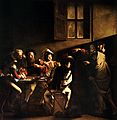Matthew the Evangelist facts for kids
Quick facts for kids SaintMatthew the Apostle |
|
|---|---|
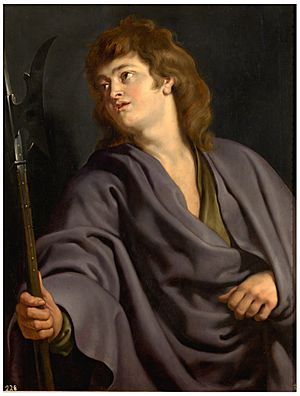
Saint Matthew (c. 1611) by Peter Paul Rubens
|
|
| Apostle, Evangelist, and Martyr | |
| Born | Capernaum, Galilee, Roman Empire |
| Died | 1st century AD Ethiopia |
| Venerated in | |
| Canonized | Pre-Congregation |
| Feast |
|
| Attributes | Angel |
| Patronage | Accountants; Salerno, Italy; bankers; tax collectors; perfumers; civil servants |
| Major works | Gospel of Matthew |
Matthew the Apostle (also known as Saint Matthew) was one of the twelve main followers of Jesus. He is mentioned in the New Testament of the Christian Bible. Many Christians also believe he wrote the Gospel of Matthew, one of the four books about Jesus's life. Because of this, he is also called Matthew the Evangelist. The name Matthew means 'Gift of God'.
The New Testament says that Matthew became a follower of Jesus. Early Christian writers believed that Matthew first shared the Christian message with Jewish people in Judea. Later, he traveled to other countries to preach.
Contents
Matthew in the New Testament
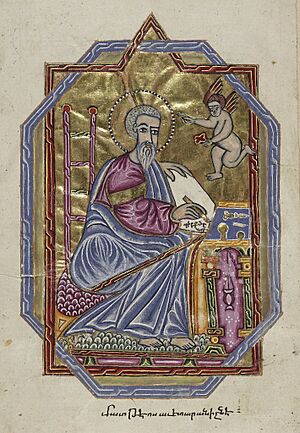
The Bible tells us about Matthew in the books of Matthew, Mark, Luke, and Acts. In Matthew 9:9, it says that Jesus called Matthew to follow him. At that time, Matthew was working as a tax collector in a town called Capernaum.
Tax collectors in those days collected money for the Roman Empire. They were often disliked because they sometimes charged people more than they should. Despite this, Jesus chose Matthew to be one of his closest followers. Matthew is also listed among the Twelve Disciples in other parts of the New Testament.
Matthew's Ministry and Travels
After Jesus went to heaven, Matthew and the other disciples stayed in Jerusalem. They continued to share the message that Jesus was the promised Messiah.
Early Christian leaders like Irenaeus and Clement of Alexandria wrote about Matthew's work. They said he preached to Jewish communities in Judea. After that, he traveled to other places. Many old writings suggest he went to Ethiopia.
Both the Catholic Church and the Orthodox Church believe that Matthew died as a martyr. This means he was killed because of his Christian faith. One tradition says that in Ethiopia, Matthew helped the daughter of King Egippus, Ephigenia, become a nun. When the next king, Hirtacus, wanted to marry Ephigenia, Matthew refused. He told the king that Ephigenia was dedicated to God. The angry king then ordered his guards to kill Matthew while he was at the altar during a church service.
The Gospel of Matthew's Origin
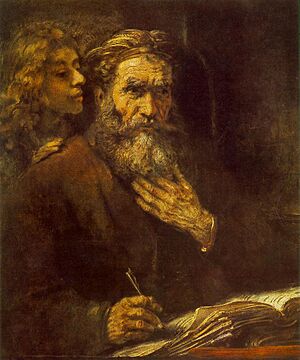
For a long time, Christians believed that the Gospel of Matthew was written by Matthew the Apostle. An early Christian bishop named Papias of Hierapolis (around AD 60–163) mentioned this. He said Matthew collected Jesus's sayings in the Hebrew language. Then, others translated them into Greek.
Another early Christian writer, Origen (around 184–253), also said Matthew wrote the first Gospel. He believed it was written in Hebrew near Jerusalem for Hebrew Christians. Later, it was translated into Greek.
However, most modern Bible scholars today think the Gospel of Matthew was written by someone else. The author is not named in the book itself. Scholars believe the title "according to Matthew" was added later, in the second century.
Other Gospels Attributed to Matthew
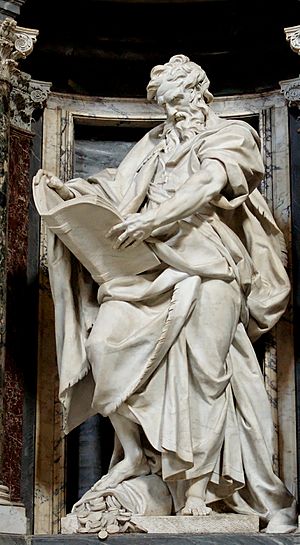
In the 3rd century, some Jewish-Christian groups used other gospels that they believed were written by Matthew. These are called Jewish–Christian gospels. We only have small parts of these gospels today, found in writings by other authors.
These include the Gospel of the Nazarenes, the Gospel of the Ebionites, and the Gospel of the Hebrews. Most experts think these texts were written in Greek and are related to the Gospel of Matthew we have in the Bible. A few believe they might be parts of an older Aramaic or Hebrew version.
There is also the Gospel of Pseudo-Matthew. This book was put together in the 7th century from three other stories. It tells more about the childhood of Jesus and Mary.
Honoring Saint Matthew
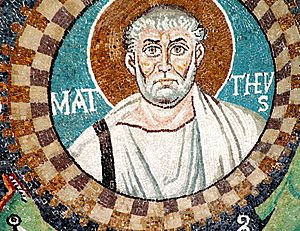
Matthew is honored as a saint in many Christian churches. These include the Roman Catholic, Eastern Orthodox, Lutheran, and Anglican churches. His special day, or feast day, is celebrated on September 21 in Western churches. Eastern churches celebrate it on November 16.
Matthew's tomb is believed to be in the crypt of Salerno Cathedral in southern Italy.
In Christian art, Matthew is often shown with a winged man. This symbol comes from the Bible's book of Revelation. It represents his role as an evangelist, sharing the human story of Jesus. Famous paintings of Matthew include those by Caravaggio in Rome. These paintings show Jesus calling Matthew from his work as a tax collector.
Matthew in Islam
The Quran, the holy book of Islam, talks about Jesus's disciples. It does not mention their names. However, Islamic writings and commentaries do name them. Matthew is included among these disciples. Some Islamic traditions say that Matthew and Andrew were two disciples who went to Ethiopia. There, they preached the message of God.
Images for kids
-
The Calling of Saint Matthew, 1599–1600, Caravaggio
-
Saint Matthew and the Angel by Guido Reni, 1620–1630
See also
 In Spanish: Mateo el Evangelista para niños
In Spanish: Mateo el Evangelista para niños
- Mark the Evangelist
- Luke the Evangelist
- John the Apostle
- Saint Matthew the Apostle, patron saint archive
 | Delilah Pierce |
 | Gordon Parks |
 | Augusta Savage |
 | Charles Ethan Porter |




